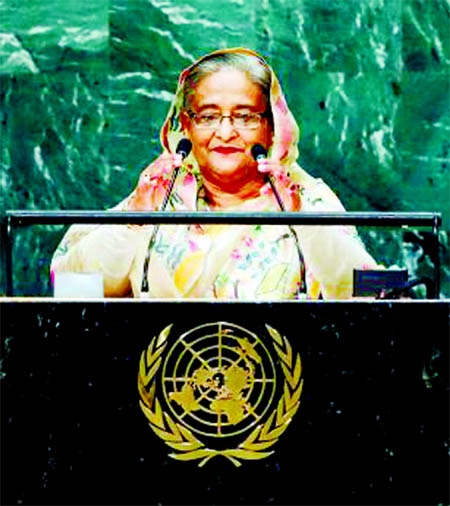
Prime Minister Sheikh Hasina on Wednesday urged the world community to work together to uproot militancy and terrorism, and plug the sources of funds, arms and ammunition as well as moral and material support to militants and terrorists across the borders.
“Terrorists have no religion, caste or creed. We must unite in our resolve to defeat and degrade them in all forms and manifestations. We have to identify the root causes of terrorism and violent extremism,” she said.
The Prime Minister made the call while delivering her speech in the 71st UN General Assembly (UNGA) general debate. Like previous years, she delivered her speech in Bengali. Sheikh Hasina also reminded all that she talked about terrorism and violent extremism last year as one of the two major global challenges of the time. “We see these menaces sweeping across borders. No country seems immune… no individual is beyond their target. The terrorists are killing now and often many innocent people everywhere from the USA to Europe, Africa to Asia,” she said. The Prime Minister also laid emphasis on finding out the mentors, masterminds, abettors, financiers, arms suppliers and trainers of the terrorists and extremists, and taking strong action against them. “As a victim of terrorist attacks, I myself have a ‘zero tolerance’ approach to terrorism and violent extremism. Our government did succeed in disintegrating the homegrown terrorist groups, plugging their regular financing pipelines, and flushing out the regional operatives from our territory,” she said.
Hasina said with the vicious rise of certain international terrorist entities, it appears some of the local fringe elements have drawn inspiration and managed to regroup and rebrand themselves. “Bangladesh, a unique country of religious harmony, experienced a grisly attack on July 1 when homegrown terrorists killed 20 people at a Dhaka restaurant. We had been able to rescue 13 hostages unhurt. The horrific incident imprinted a deep scar on the hearts of Bangladeshi people. We’re now in a battle with this new wave of terrorism. We’ve undertaken massive programmes to awaken people against radicalisation and stand against militancy and extremism,” she said. Hasina mentioned that she had called for assistance from society and got unprecedented response. “Our women, youths, families and communities can be our vanguards in offsetting extremism and radicalisation. I’m confident, with our people’s resilience and support, we’ll make sure terrorists will have no place on our soil.”
Talking about some challenges in the globalised world, she said there are also potential opportunities and benefits for all, only if all know how to manage it right. “We’re all gathered here to serve our ‘One Humanity’. Let’s work through our differences, and find common grounds to make pragmatic changes we wish to see in the world around us.” She said the UN provides a unique platform to do so. “Let’s renew our resolve to create an organisation of enduring relevance.” Noting that the world is now at a juncture, Hasina said all have the end of these scourges in sight. “There’re many creative and practical solutions in our hands. The amazing power of technology, ideas and global citizens make us imagine a ‘brave new world’.”
About the Sustainable Development Goals (SDGs) adopted in 2015, she said the political will behind the agenda needs to be translated into concrete and meaningful support for countries that are lagging behind.

To catch up, Hasina said, the developing world needs access to transformative technologies. “The internationally agreed development commitments for the Least Developed Countries (LDCs) must be fulfilled to pave the way for their graduation. The Technology Bank for LDCs should be geared at promoting innovation and predictable resource flow.” In Bangladesh, she said, the government has already mainstreamed most SDGs into the national development plans. A platform under the supervision of Prime Minister has been created to coordinate and monitor the work. “Consultations are going on with the local governments, civil society, media and academia.” Listing various development activities in Bangladesh, she said it has experienced one of the fastest poverty reduction rates in the world with a modest resource base. “We’ve brought down poverty from 56.7 percent in 1991 to 22.4 percent today. “We’ve already graduated from the UNDP’s low human development category to medium, and also the World Bank’s lower-middle income status.”
Hasina said despite global recession, the export earnings grew by more than 3 times to USD 34.24 billion; remittance flow increased nearly 3 times; and foreign currency reserve jumped by 8.5 times from US$ 3.5 billion to over US$ 31 billion over the last seven years. During the same period, the power generation capacity increased by almost 3 times and foreign direct investment also rose by 3 times.
“A key to our development strategy is our focus on addressing inequality through social security, decent work and financial inclusion. We allocate over 13 per cent of our budget to social safety net spending, which is 2.3 per cent of our GDP.” But, Sheikh Hasina said, the climate change threatens many of the country’s development gains.
She said the landmark Paris Climate Agreement recognises the importance of adaptation, loss and damage, and climate justice. In this connection, she mentioned that Bangladesh cabinet has ratified the agreement. “We hope that the large carbon emitting countries would ratify the Agreement soon.”
She said Bangladesh shall remain vocal about recognising the role of national judicial processes in ensuring accountability and justice for mass atrocities. “We have moved past decades of impunity to ensure the trial of the local perpetrators of genocide and crimes against humanity during our Liberation War in 1971.”
She mentioned that the recent efforts to resume the Middle East Peace Process and end hostilities against the brotherly Palestinian people must be pursued in the right direction.

